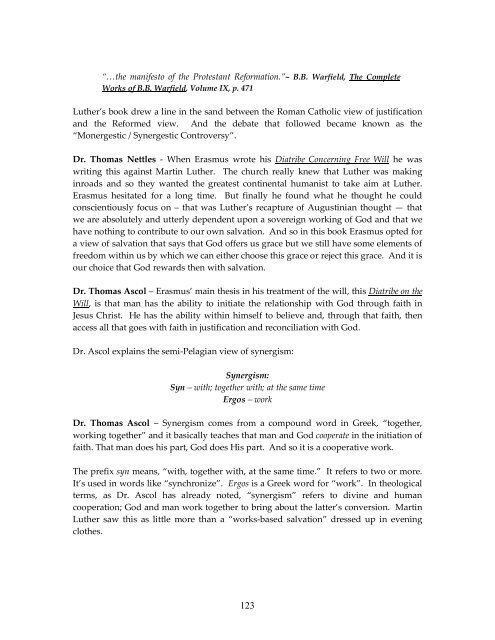AG STUDY GUIDE FINAL - The Forerunner
AG STUDY GUIDE FINAL - The Forerunner
AG STUDY GUIDE FINAL - The Forerunner
You also want an ePaper? Increase the reach of your titles
YUMPU automatically turns print PDFs into web optimized ePapers that Google loves.
“…the manifesto of the Protestant Reformation.”~ B.B. Warfield, <strong>The</strong> Complete<br />
Works of B.B. Warfield, Volume IX, p. 471<br />
Luther’s book drew a line in the sand between the Roman Catholic view of justification<br />
and the Reformed view. And the debate that followed became known as the<br />
“Monergestic / Synergestic Controversy”.<br />
Dr. Thomas Nettles - When Erasmus wrote his Diatribe Concerning Free Will he was<br />
writing this against Martin Luther. <strong>The</strong> church really knew that Luther was making<br />
inroads and so they wanted the greatest continental humanist to take aim at Luther.<br />
Erasmus hesitated for a long time. But finally he found what he thought he could<br />
conscientiously focus on – that was Luther’s recapture of Augustinian thought — that<br />
we are absolutely and utterly dependent upon a sovereign working of God and that we<br />
have nothing to contribute to our own salvation. And so in this book Erasmus opted for<br />
a view of salvation that says that God offers us grace but we still have some elements of<br />
freedom within us by which we can either choose this grace or reject this grace. And it is<br />
our choice that God rewards then with salvation.<br />
Dr. Thomas Ascol – Erasmus’ main thesis in his treatment of the will, this Diatribe on the<br />
Will, is that man has the ability to initiate the relationship with God through faith in<br />
Jesus Christ. He has the ability within himself to believe and, through that faith, then<br />
access all that goes with faith in justification and reconciliation with God.<br />
Dr. Ascol explains the semi-Pelagian view of synergism:<br />
Synergism:<br />
Syn – with; together with; at the same time<br />
Ergos – work<br />
Dr. Thomas Ascol – Synergism comes from a compound word in Greek, “together,<br />
working together” and it basically teaches that man and God cooperate in the initiation of<br />
faith. That man does his part, God does His part. And so it is a cooperative work.<br />
<strong>The</strong> prefix syn means, “with, together with, at the same time.” It refers to two or more.<br />
It’s used in words like “synchronize”. Ergos is a Greek word for “work”. In theological<br />
terms, as Dr. Ascol has already noted, “synergism” refers to divine and human<br />
cooperation; God and man work together to bring about the latter’s conversion. Martin<br />
Luther saw this as little more than a “works-based salvation” dressed up in evening<br />
clothes.<br />
123


